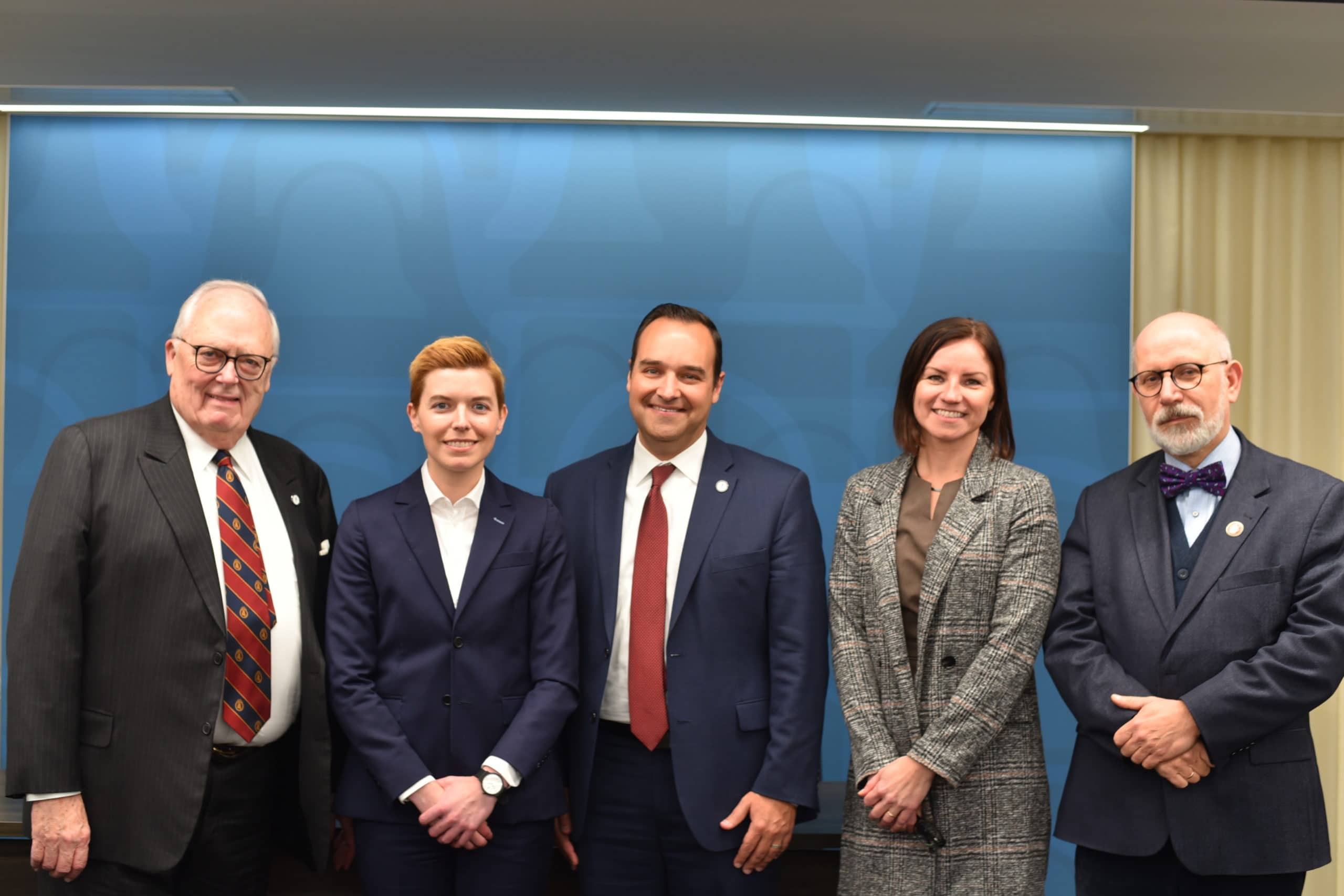VOC Hosts Polish Studies Conference

On November 19, the Victims of Communism Memorial Foundation hosted its 2021 Polish Studies Conference, “The End(s) of Communism: Paths to De-Communization in the Former Eastern Bloc.” The event brought together scholars, international affairs experts, and supporters from across the globe to discuss the peaceful collapse of communism across Central and Eastern Europe in 1989 and the negotiated power-sharing agreements that trailed in its wake.
Dr. Janusz Onyszkiewicz, Renowned Polish Dissident, Delivers Keynote
Dr. Janusz Onyszkiewicz delivered the keynote address. Renowned Polish dissident, professor of mathematics, and former member of the European Parliament, Dr. Onyszkiewicz became active in Poland’s democratic opposition in the mid-1960s. He participated in the landmark 1968 strikes and demonstrations for freedom of speech and research and subsequently worked as an organizer for the Solidarity trade union movement in the Warsaw region in 1980. Imprisoned for over a year following the introduction of martial law on December 13, 1981, Dr. Onyszkiewicz went on to serve as Solidarity’s national spokesman until 1989, and later as a member of the National Executive (Presidium).
Dr. Onyszkiewicz has served as a member of the Polish parliament (1989-2001), a member of the Executive Committee of the Inter-Parliamentary Union (1989-1991), chairman of the Polish delegation to the WEU and NATO Parliamentary Assemblies, Deputy Defense Minister (1990-1991) and Defense Minister (1991-1993 and 1997-2000). He was elected to the European Parliament in 2004, where he served until 2009. During this time he was elected Vice-President and Vice-Chairman of the Parliament’s Foreign Affairs Committee.
A mathematician by training, Dr. Onyszkiewicz is Senior Lecturer at the Mathematics Institute of Warsaw University, and has authored several books and papers on mathematical logic and set theory. He holds an MSc and PhD in pure mathematics, and received an honorary doctorate from the University of Leeds.
Conference Proceedings
1989 – subsequently hailed as the “year of miracles” – witnessed the sudden and surprising collapse of Europe’s communist dictatorships. Drawing on their involvement in these historic events, the panelists offered their reflections on the revolutions that swept communism from Central and Eastern Europe in 1989 and considered their aftereffects from the perspective of three decades later.
- Ambassador Andrew Bremberg, President and CEO, Victims of Communism Memorial Foundation (moderator)
- Ambassador Daniel Fried, Weiser Family Distinguished Fellow at the Atlantic Council; Former U.S. Ambassador to Poland
- Ambassador Géza Jeszenszky, Former Hungarian Ambassador to the U.S. and former Minister of Foreign Affairs
- Ambassador Martin Palouš, Director and Senior Fellow, Florida International University School of International and Public Affairs’ Václav Havel Center for Human Rights and Diplomacy Initiative (virtual)
This panel considered the first decade of post-communist transition. The panelists examined the varying levels of success with which newly sovereign nations ushered in political, economic, and social change while also considering lessons “learned” from this period of systemic transformation.
- Milda Boyce, Director of Fellowship Programs, Victims of Communism Memorial Foundation (moderator)
- Mark Kramer, Director of Cold War Studies, Harvard University, and Senior Fellow of Harvard’s Davis Center (virtual)
- Irena Lasota, President, Institute for Democracy in Eastern Europe
- David Satter, Senior Fellow, Hudson Institute
- Eugeniusz Smolar, Journalist and former dissident (virtual)
Approaches to Transitional Justice
The countries of the former Eastern bloc have adopted a variety of approaches to so-called transitional justice. Some have instituted radical lustration regimes while others have afforded their citizens access to a wide range of files identifying secret informers among former communist officials. This panel explored the different transitional justice programs pursued throughout the region. The speakers also discussed the conditions that facilitate or hinder efforts to come to terms with human rights abuses committed under communism.
- Dr. Chelsea Michta, Research Fellow in Polish Studies, Victims of Communism Memorial Foundation (moderator)
- Dr. Arnaud Kurze, Associate Professor, Montclair State University (virtual)
- Dr. Dalibor Rohac, Senior Resident Fellow, American Enterprise Institute
- Dr. Lavinia Stan, Professor, St. Francis Xavier University (virtual)
- Dr. Aleks Szczerbiak, Professor, University of Sussex (virtual)
The past decade has witnessed a surge in efforts to tell the history of communism through formal channels such as museums, institutes of national memory, and cultural heritage centers. This panel discussed initiatives underway in Central and Eastern Europe as well as the Caucasus to shape the historical memory of communism.
- Kristina Olney, Director of Government Relations, Victims of Communism Memorial Foundation (moderator)
- Janusz Bugajski, Senior Fellow, Jamestown Foundation
- Dr. Hope M. Harrison, Professor, George Washington University (virtual)
- Dr. Hubertus Jahn, Professor, Cambridge University (virtual)
- Andrew Nagorski, Journalist and historian (virtual)
“Polityka historyczna”: The Case of Poland
The drive to recover and institutionalize historical narratives about the communist past has been especially vigorous and far-reaching in Poland. The panelists traced the roots of this phenomenon – referred to in Polish media and scholarship as “polityka historyczna” or “the politics of history” – and discussed their personal involvement in several of its flagship institutions.
- Dr. Chelsea Michta, Research Fellow in Polish Studies, Victims of Communism Memorial Foundation (moderator)
- Igor Janke, Chairman, Freedom Institute (virtual)
- Dr. Paweł Ukielski, Deputy Director, Warsaw Uprising Museum
The Future of the Communist Past
As younger generations come of age with little to no memory of communism, how should post-communist societies integrate the legacy of Soviet rule into their public cultures? What role is technology likely to play in attempts to foster historical awareness? This panel considered the future of efforts – both “top down” and “bottom up” – to shape popular understandings of the communist past.
- David Satter, Senior Fellow, Hudson Institute (moderator)
- Dr. Dorottya Baczoni, Historian, Institute of Twentieth Century (virtual)
- Dr. Meelis Saueauk, Senior Researcher, Estonian Institute of National Memory

